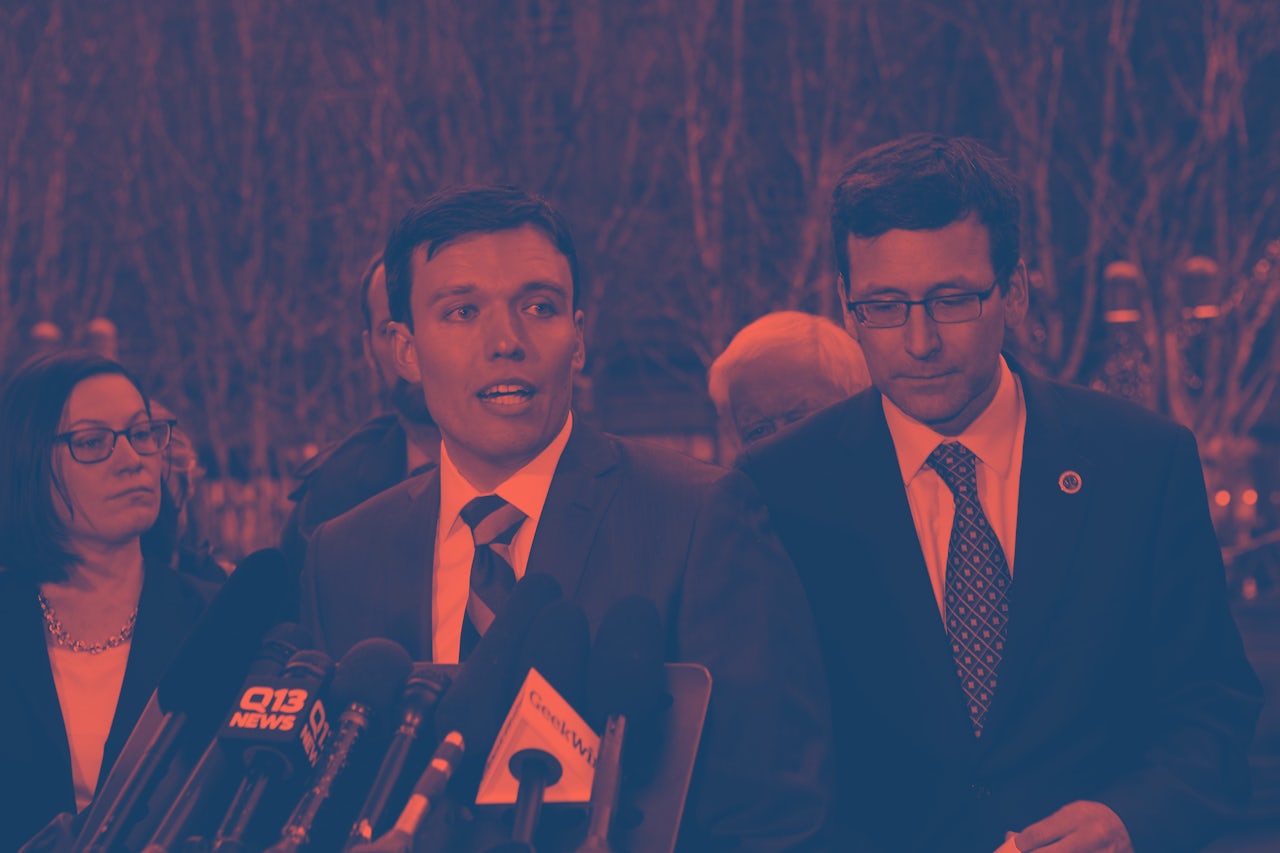It’s unusual to livestream a hearing in the Ninth Circuit Court of Appeals, and it’s unusual to have lawyers do oral arguments by phone on short notice, but that’s what happened Tuesday in State of Washington et. al. v. Donald J. Trump et. al.
The push for the emergency hearing came from the White House, which wanted to overturn a lower court’s decision to temporarily freeze President Donald Trump’s travel ban on natives of seven Muslim-majority countries.
That temporary restraining order was granted because attorneys for Washington successfully convinced a lower court that Trump’s travel ban was causing immediate and irreparable harm, and that it was in the public interest to put it on hold until the case could be argued in full. The White House immediately fired back: “At the earliest possible time, the Department of Justice intends to file an emergency stay of this outrageous order and defend the executive order of the president, which we believe is lawful and appropriate,” Press Secretary Sean Spicer said in a statement that was later revised to remove the word “outrageous.”
The hearing was narrowly focused on the question of that emergency stay — in other words, whether the appellate judges should undo that temporary restraining order. However, the arguments strayed into the greater question of whether the executive order had merit. Things got heated — especially when August E. Flentje, the lawyer for the federal government who was tapped just hours before the hearing, was making his case.
At one point, Judge Richard R. Clifton asked how many federal offenses had been committed by immigrants from the seven countries — Iraq, Iran, Yemen, Somalia, Sudan, Syria, and Libya — then answered his own question: “There haven’t been any.” Flentje then protested that the proceedings have been moving so quickly that there hasn’t been time to collect all the evidence, prompting Judge Michelle T. Friedland to point out that it was the White House that requested this emergency hearing.
“This is a hot bench,” reporter Charlie Savage wrote in the New York Times liveblog of the hearing. “All three judges are now jumping on Flentje’s legal argument simultaneously — talking over one another. Not good for President Trump,” reporter Eric Lichtblau wrote.
About 25 minutes into the government’s 30 minutes of allotted time, the judges went for the jugular. Judge William C. Canby asked, “Could the president simply say in the order, ‘We’re not going to let any Muslims in’?” resulting in a few minutes of floundering by the government attorney as the judges tried to pin him down on an answer.
Noah Purcell, the solicitor general for the state of Washington, took up the argument to keep the temporary restraining order in place.
The original case was brought by Washington and joined by Minnesota. The states are alleging that their residents were irreparably harmed by the ban.
Purcell also faced tough questions from the judges, but nothing like the grilling given to Flentje. In one exchange with a skeptical Judge Canby, Purcell argued that the ban amounts to religious discrimination.
While Purcell focused on the effects the ban would have on people — “infants, schoolchildren, grandmothers, people who pose no plausible threat whatsoever to this country” — the government’s case emphasized that the president has the authority to make national security decisions and questioned the lower court’s “troubling second guessing of the president’s national security determination.��
At the end of the hearing, Flentje had five minutes for rebuttal. He argued that the temporary restraining order was overbroad. He also ventured into Trumpian rhetoric by blaming the media.
The hearing, which was also streamed live on CNN with only the audio and photos of the participants, lasted an hour and eight minutes. The judges said they will rule as soon as possible. “We appreciate the importance and the time-sensitive nature of this matter, and we’ll endeavor to issue our decision as soon as possible,” Judge Friedland said.
This is all preliminary stuff, and the case — one of multiple lawsuits being filed around the country — is expected to go all the way to the Supreme Court.
Listen to the full, unedited audio below.
